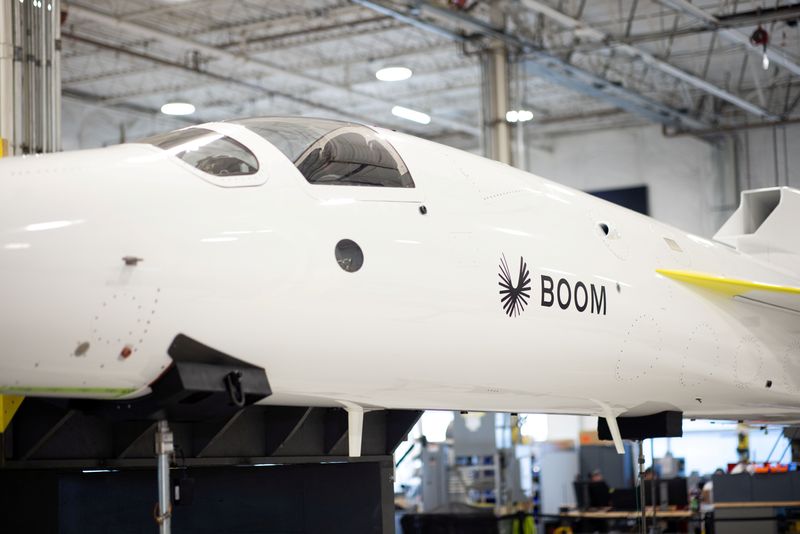By Abhijith Ganapavaram
(Reuters) - Boom Supersonic struck a partnership with a unit of Kratos Defense (NASDAQ:KTOS) & Security Solutions to develop an engine for its planned aircraft, after several leading industry players gave the U.S. startup a cold shoulder.
The company is trying to bring back supersonic flying with its Overture aircraft, which aims to cut transatlantic flying time in half to about 3-1/2 hours, while carrying 65-88 passengers.
Boom now expects its first "Overture" jet to leave the factory in 2026, one year behind schedule, and begin test flights the following year. It added it was aiming for certification in 2029.
Supersonic Concorde-style flights have drawn interest from major carriers United Airlines and American Airlines (NASDAQ:AAL), but Boom's push to be among the first to roll out such a plane suffered a setback earlier this year when Rolls-Royce (OTC:RYCEY) pulled out and other leading suppliers opted not to fill the gap.
General Electric (NYSE:GE), Safran (EPA:SAF) and Honeywell International Inc (NASDAQ:HON) have all said they have no plans to develop civil supersonic engines for the time being.
That left Boom scouting for new partners to help shoulder heavy investments needed to launch a new jet and engine. The firm has raised $319 million as of October 2021 and was valued at $1.2 billion, according to PitchBook Data.
Boom Chief Executive Officer Blake Scholl told Reuters on Monday the company was "well-funded", but did not disclose specific details.
Scholl said Boom decided to take the lead on developing its own engines after looking at "limitations" of adapting a subsonic engine and the "traditional engine business model."
DESIGN PARTNER
Under the new deal, Kratos unit Florida Turbine Technologies (FTT) will design the engine and build some of the first units.
Kratos currently supplies small, high-performance jet engines for cruise missiles and drones, according to its website. Boom said FTT's engineers have also worked on advanced U.S. supersonic fighter engines.
Civil engine makers invest billions of dollars, which they recoup over the lifetime of engines through aftermarket sales.
Although barriers to entry are falling in high-tech sectors such as space, analysts say it remains a significant challenge to keep up with the billions of dollars and certification hurdles required to develop a new engine for passenger use.
Raytheon Technologies (NYSE:RTX) unit Pratt & Whitney is estimated to have spent $10 billion to develop its latest engine to re-enter the civil market after a gap of several years.
China remains in the early stages of challenging Western engine manufacturers with its own alternative engine portfolio.

Boom will hold the intellectual property rights for the engine and will lead the program, Scholl said.
The company also said 3D-printed-components expert GE Additive will be a supplier to the engine program and maintenance firm StandardAero will also be a partner.